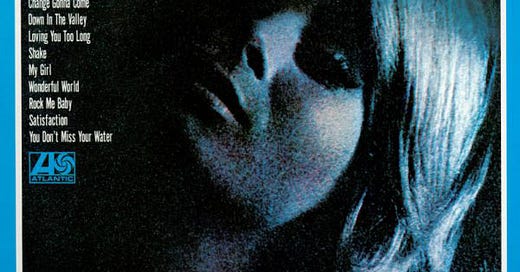'Till your well runs dry
Otis Redding - 'You Don't Miss Your Water' (Otis Blue/Otis Redding Sings Soul -1965)
Much like our previous entry, David Bowie's Hunky Dory had a tribute side, Otis Redding packs the end of his 1965 album Otis Blue with cover versions. "You Don't Need Your Water" was a William Bell single from 1961 and is widely considered his signature recording. The Byrds have also tackled it on Sweetheart of The Rodeo, Percy Sledge, Brian Eno from the film Married To The Mob, Pete Tosh and The Triffids also covered the song, though not Craig David.
The Otis Redding album Otis Blue/Otis Redding Sings Soul, bar one track, was recorded over only two days /twenty-four hours in July 1965. The session musicians working on it included Isaac Hayes and Stax's house band, Booker T. & the M.G.'s at the studio in Memphis, Tennessee.
At this point, we should acknowledge Otis Blue as one of the first records that wasn't a couple of hit singles, and the rest knocked off. In July 1965, Rubber Soul, Highway 61 Revisited, The Who Sings My Generation and Out of Our Heads hadn't seen the light of day. So, the concept of a pop/rock album as an artistic statement hadn't quite crystalised beyond jazz records like A Love Supreme, Kind of Blue and some of the Frank Sinatra LPs from the 1950s, never mind an R&B one.
With three covers of Sam Cooke songs, tributes after being shot dead in late 1964, front-loading the album, the back section of five covers display more of Redding's range. Like Dusty Springfield showed at her own Memphis recording session at the end of the decade, and we covered a few months back, this closer is not remotely funky compared to other songs - here I’m contrasting it was something like "Down In The Valley."
If there was any doubt, Redding's version of the song is an unabashed confession of an unfaithful man. The man realises how foolish he has been and seeing not only the error of his ways but is audibly beseeching the woman he took for granted. By the time he gets to the "I keep missing my water" outro section, it is hard not to feel some sympathy with the dirty dog.
I won't go far as to call it an epic closer; the instrumentation is primarily restrained compared to the vocal performance, which is one of the record's most refined. As Otis Blue has consistently excellent vocals; it is saying something to crown this self-aware yearning as the record's best delivery when it also contains "I've Been Loving You Too Long", but I am going to do just that.
Remarkably, Redding delivered so much before the age of twenty-seven and on this final track, he blends gospel and the blues so well we end up with Soul and soul.




